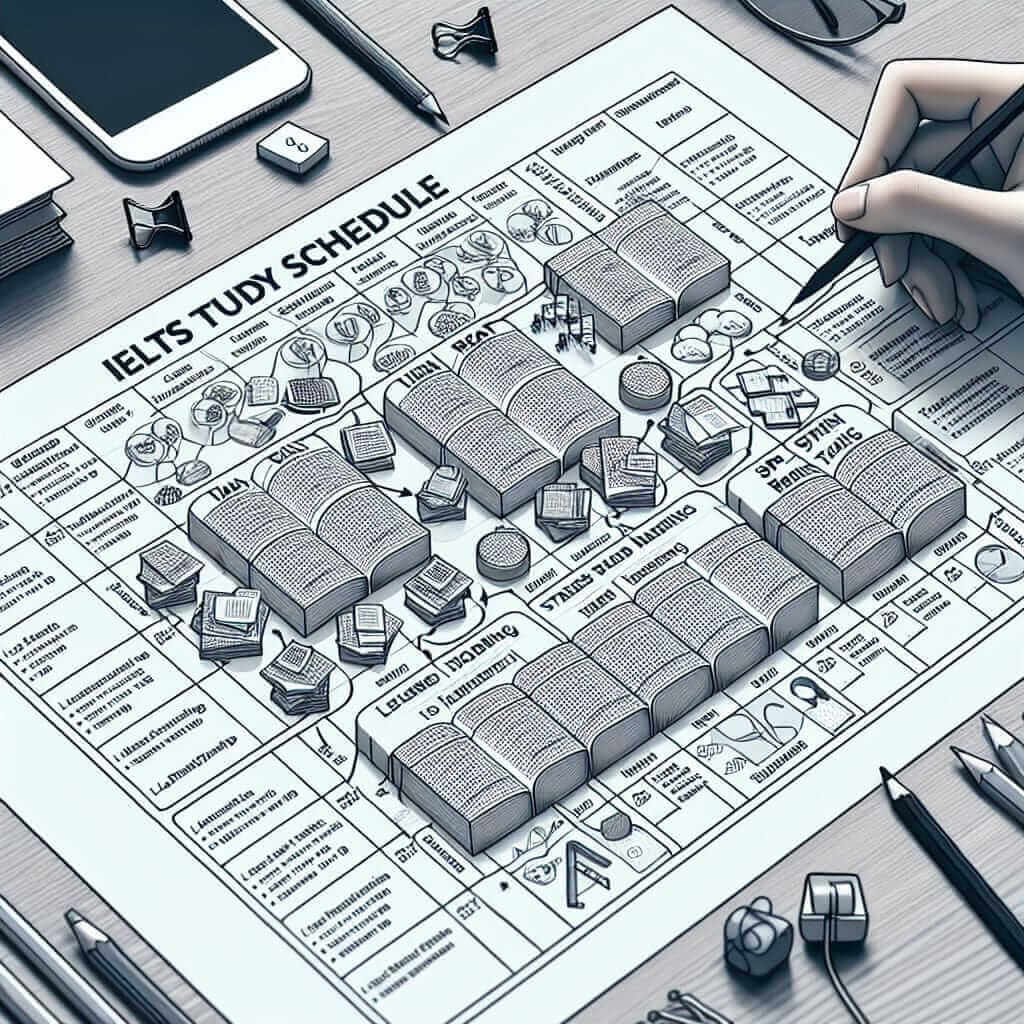As an IELTS instructor with over 20 years of experience, I often get asked by my students, “What’s the best way to create an effective IELTS study schedule?”. A well-structured schedule is like a roadmap to success in your IELTS journey. It’s not just about allocating hours to study but also about optimizing your time for maximum learning and improvement.
Understanding the Importance of a Study Schedule
Creating a schedule isn’t just about ticking boxes; it’s about understanding your strengths and weaknesses and tailoring your study time accordingly. Here’s why a personalized IELTS study plan is crucial:
- Focus and Consistency: A schedule helps you stay focused on your goals and ensures consistent progress.
- Time Management: Juggling work, studies, or other commitments becomes easier when you have a clear plan.
- Stress Reduction: Knowing what to study and when can significantly reduce exam anxiety.
- Effective Learning: Planning allows you to allocate specific time slots for different skills, improving absorption and retention.
Crafting Your Personalized IELTS Study Plan
Now, let’s break down the process of building your own IELTS study schedule:
1. Assess Your Starting Point
- Take a Practice Test: Begin by taking a full-length IELTS practice test. This will give you a baseline score and highlight your strengths and areas needing improvement.
- Analyze Your Results: Carefully analyze your practice test results. Identify which sections you scored well in and which need more attention.
2. Set Realistic Goals
- Target Score: Determine your desired IELTS band score. This will influence the intensity and duration of your preparation.
- Timeframe: Be realistic about how much time you can dedicate each day and week to studying.
3. Design Your Schedule Template
- Choose a Format: Opt for a digital calendar, a physical planner, or a simple spreadsheet – whichever works best for you.
- Allocate Time Slots: Divide your study time into manageable chunks. Aim for sessions of 1-2 hours with short breaks in between.
4. Prioritize and Integrate Skills
- Focus on Weaknesses: Allocate more time to the skills where you need the most improvement, based on your practice test analysis.
- Integrate Skills: Don’t study skills in isolation. Find ways to combine them, such as practicing writing essays using vocabulary you’ve learned.

5. Example Study Schedule
Here’s a sample weekly schedule for a student aiming to improve their score within two months:
Monday:
- Morning (1 hour): Listening practice (focus on multiple-choice questions)
- Evening (1.5 hours): Reading practice (focus on identifying the writer’s views)
Tuesday:
- Morning (1.5 hours): Writing Task 1 practice (analyzing graphs and charts)
- Evening (1 hour): Speaking practice (recording yourself answering sample questions)
Wednesday:
- Morning (1 hour): Grammar review (articles, prepositions)
- Evening (1 hour): Vocabulary building (focus on a specific theme like education)
Thursday:
- Morning (1.5 hours): Writing Task 2 practice (opinion essays)
- Evening (1 hour): Speaking practice (discussing topics with a study partner)
Friday:
- Full-length practice test (all sections) under timed conditions
Saturday:
- Review practice test results, identify areas for improvement
Sunday:
- Rest and recharge
6. Flexibility and Adaptation
- Life Happens: Be prepared to adjust your schedule as needed. Don’t be afraid to reschedule a study session if something unexpected comes up.
- Regular Review: Assess your progress regularly. Are you meeting your weekly goals? If not, don’t hesitate to tweak your schedule.
Tips for Effective Scheduling
- Specific Goals: Instead of “study reading,” aim for “complete two reading passages and analyze the answers.”
- Variety is Key: Avoid monotony by alternating between different skills and question types.
- Practice Tests: Regularly take full-length practice tests under timed conditions to build stamina and track progress.
- Rest and Recharge: Don’t underestimate the power of breaks. Schedule time for relaxation and leisure to avoid burnout.
Conclusion
Creating and sticking to a well-planned IELTS study schedule is an investment in your success. Remember, the most effective schedule is one that is tailored to your individual needs, learning style, and target band score. Be consistent, stay motivated, and don’t be afraid to adapt your plan along the way. With dedicated effort and a strategic approach, you can achieve your IELTS goals. Good luck!